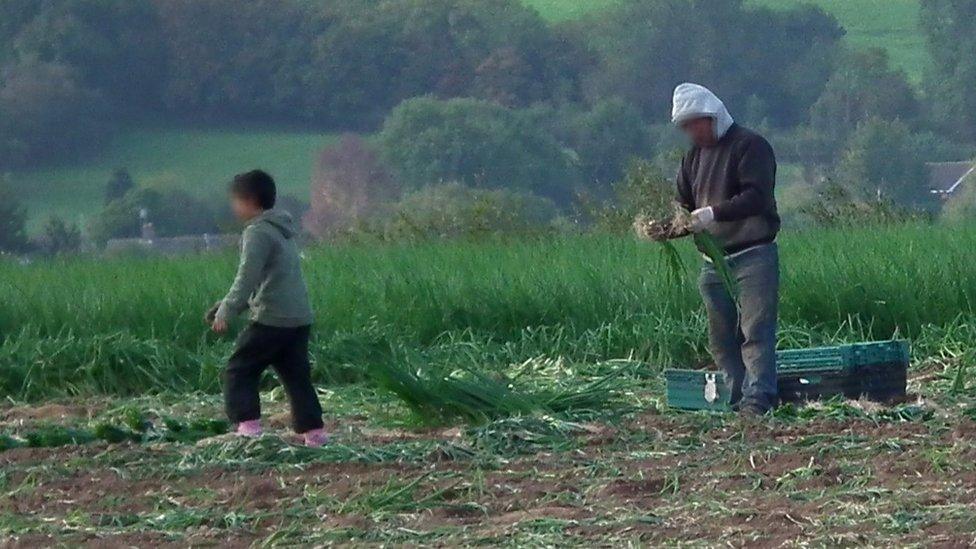Gangmasters and migrant workers: What you need to know
- Published
The work is hard and repetitive. But for migrant workers the prospect of a job on a farm or gathering shellfish in England is an attractive one. But what regulates this industry and what can be done to ensure workers are treated fairly?
Who monitors the agencies?
Agencies that provide workers to the agriculture, shellfish and processing and packing sectors have to be regulated by the Gangmasters Licensing Authority (GLA).
It was set up to protect workers vulnerable to exploitation in the wake of the Morecambe Bay tragedy, which claimed the lives of 23 Chinese cockle pickers working illegally.
Licensing means workers are entitled to the right pay, benefits and conditions and inspections are carried out.
Currently there are 801 gangmaster licences active in England, 73 in Scotland, 25 in Wales and 26 in Northern Ireland.
How many gangmasters have faced action?
The number of revocations of licences has been dropping since 2008, when 38 gangmasters were stripped of their permits, to 20 in 2014-15.
The licensing laws have led to 75 people being prosecuted in the past seven years. The peak year was 2012-13 when there were 26 offenders punished.
A spokesman for the GLA said: "In that year there was a case with 15 defendants which inflated the annual total. When we are dealing with small numbers in general, it does not take much of an increase to result in a significant change in percentage terms."
The case involved a group of dairy farms in Wiltshire and Gloucestershire who employed Filipino herdsmen from an illegal labour provider.
The workers received between £400 and £500 a month below the legal minimum wage. All the defendants were given an absolute discharge and ordered to pay £300 each towards costs.
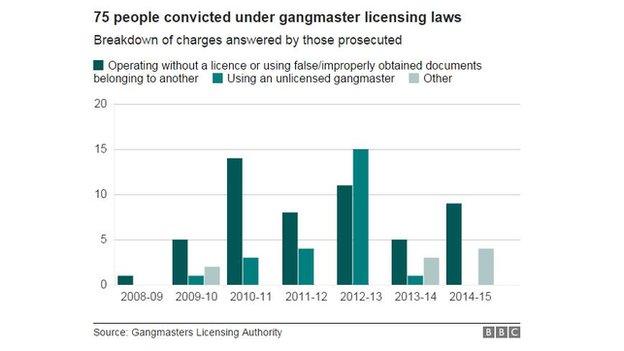
Convictions for breaching gangmaster laws
The most common complaints handled by the GLA are over people operating without a licence altogether, punishable by up to 10 years in prison, or using false or improperly obtained documents. The 10-year prison sentence can also be applied to people using an unlicensed gangmaster to supply workers.
How do complaints of 'modern day slavery' arise?
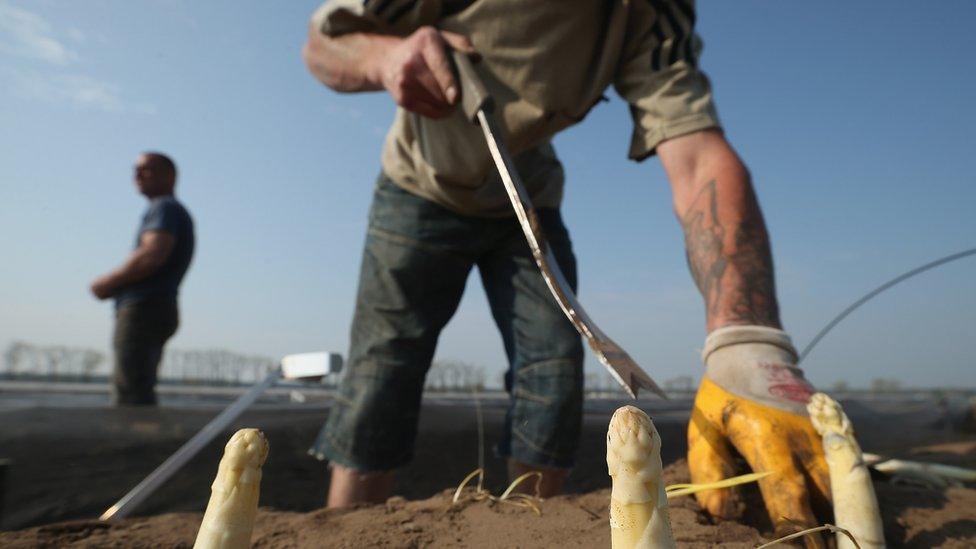
Some migrant workers have complained about their conditions
In Lincolnshire, where a BBC investigation uncovered reports of some migrant workers being exploited, the Citizens Advice Bureau says the number of cases of people concerned about their employment conditions has doubled in the past three-and-a-half years.
Stuart Hellon, chief executive of Boston Citizens Advice Bureau, said there were cases of pregnant workers being dismissed or denied jobs as well as people being "physically threatened".
"The evidence we have seen does suggest people are being exploited in the local area; from withholding holiday pay to people being verbally and physically abused in their workplaces," he said.
"I started here three-and-a-half-years ago and there used to be about a 4% to 5% proportion of cases a year. We're now running at 8% where people have issues with employment.
"Ultimately, you would describe it as keeping them on a very short leash. We've heard instances of people having passports and cash cards taken. There's issues with regards housing being attached to jobs, transport provided at rates that are not in any contract of employment, safety equipment provided that's charged for.
"People would probably say modern day slavery doesn't exist but if you're tying somebody to work and creating conditions whereby they don't have freedom of expression, they're not allowed to complain, they feel if they do complain they will lose their job, you would probably say that may be akin to modern day slavery."
He said, however, there were examples of "very good" gangmasters in Lincolnshire.
Why is Lincolnshire attractive to migrant workers?
Across England just over 1% of people work in agriculture, forestry and fishing - about 290,000 jobs out of 28.7 million.
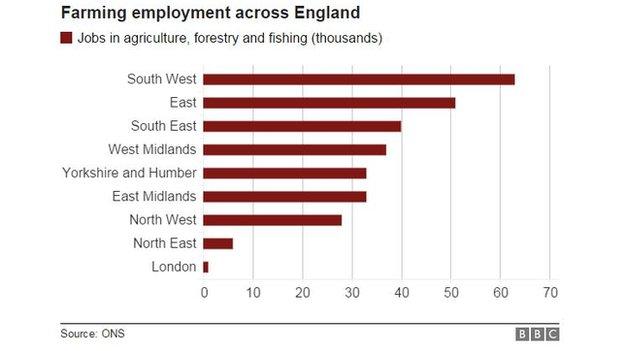
Farming jobs in England
In Lincolnshire it is much higher. About one in 20 people work in this sector, while across the Yorkshire and Humber region it provides employment for 33,000 people - with a similar number in the East Midlands.
Agricultural workers must be paid at least the UK National Minimum Wage, currently £6.70 an hour for people aged 21 and over or £5.30 for someone aged 18 to 20.
In England there were changes to terms and conditions for agricultural workers supplied by a gangmaster in 2013.
But anyone who was employed before 1 October that year was still entitled to the terms and conditions of their old contract, including overtime rates, sick pay and a £7.63 a week allowance if they kept a dog for their work.
Migrant workers in numbers
Minimum wage is three times the figure in Poland
Farm workers in UK are better off
£6.70
The hourly UK minimum wage
£2.12
The approximate hourly minimum wage in Poland
-
5 minutes is how long it would take a UK farm worker to earn the money to buy one of the cabbages they harvested
-
15 minutes is how long it would take someone on Polish minimum wage to earn the money for a cabbage
Meanwhile, the number of foreign-born workers in the UK has more than doubled since 1993.
Number of foreign-born working age people doubles in 20 years
16.7% of workforce came from overseas
6.6 million
people aged 16 to 64 were not born in the UK. In the 1990s it was 2.9 million.
-
38% of the workforce manufacturing food products was not born in the UK.
-
7% of workers in "elementary agricultural occupations" are migrants.
In Lincolnshire, 62,000 residents were not born in the UK out of a total population of 716,000, according to the Office for National Statistics. Figures show the bulk of foreign workers, around 43,000, are from the EU.
For statistical purposes Lincolnshire is split between the geographical regions of Yorkshire and the Humber and the East Midlands.
Across Yorkshire and the Humber as a whole, it is Pakistan that is the most common country of birth. In the East Midlands it is Poland, followed by India.
- Published3 December 2015
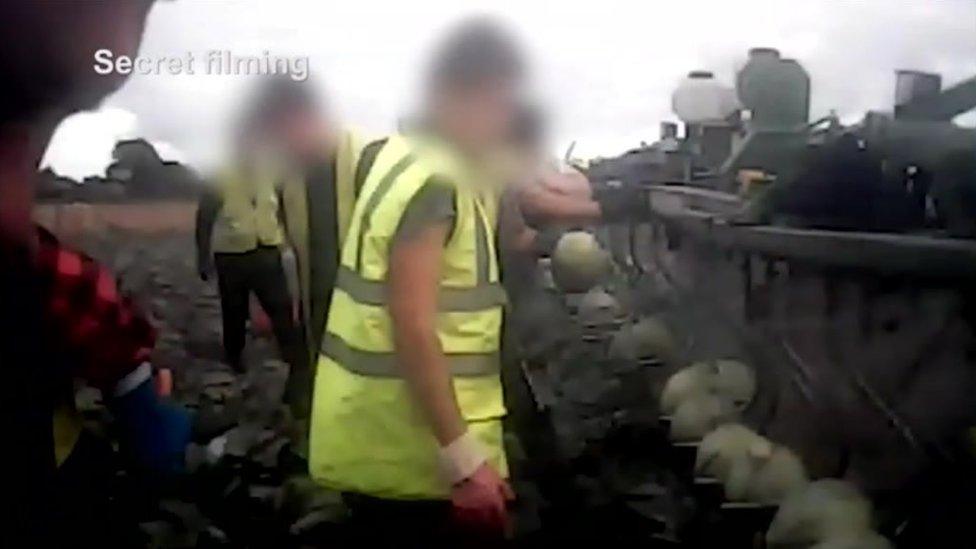
- Published5 February 2014
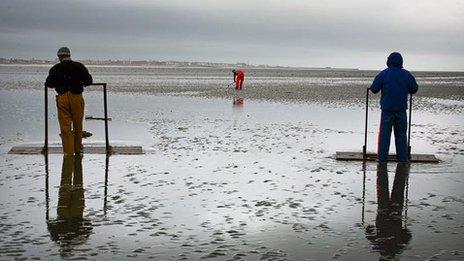
- Published11 August 2015
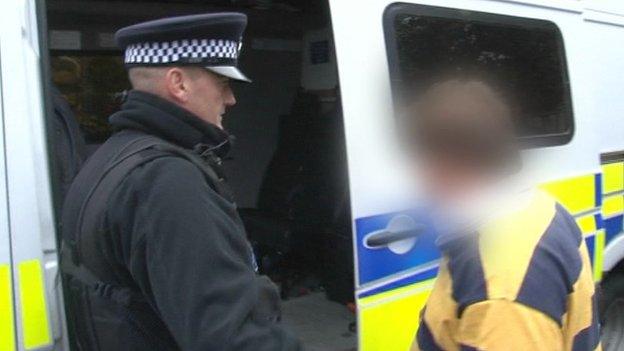
- Published16 November 2015
